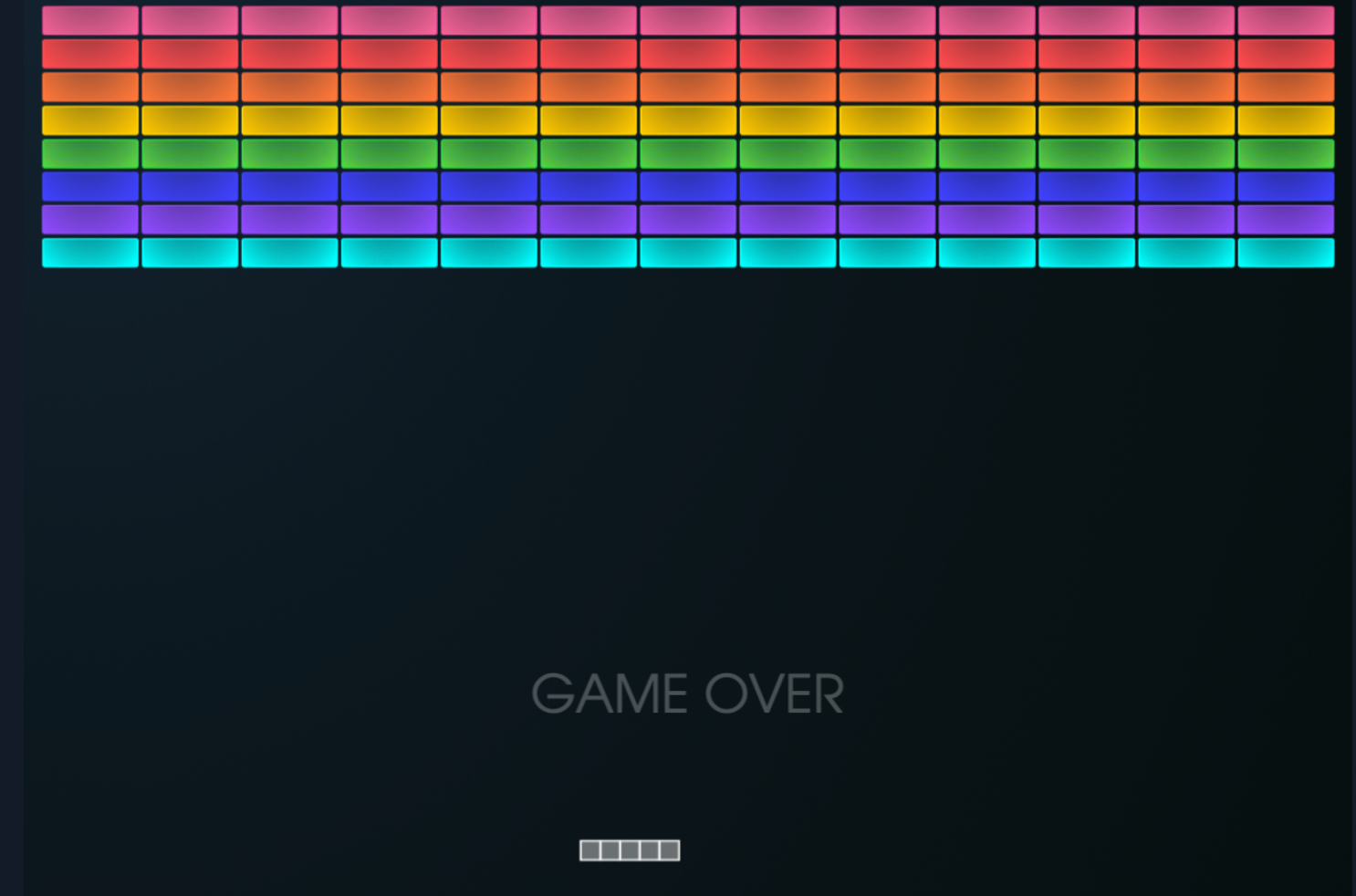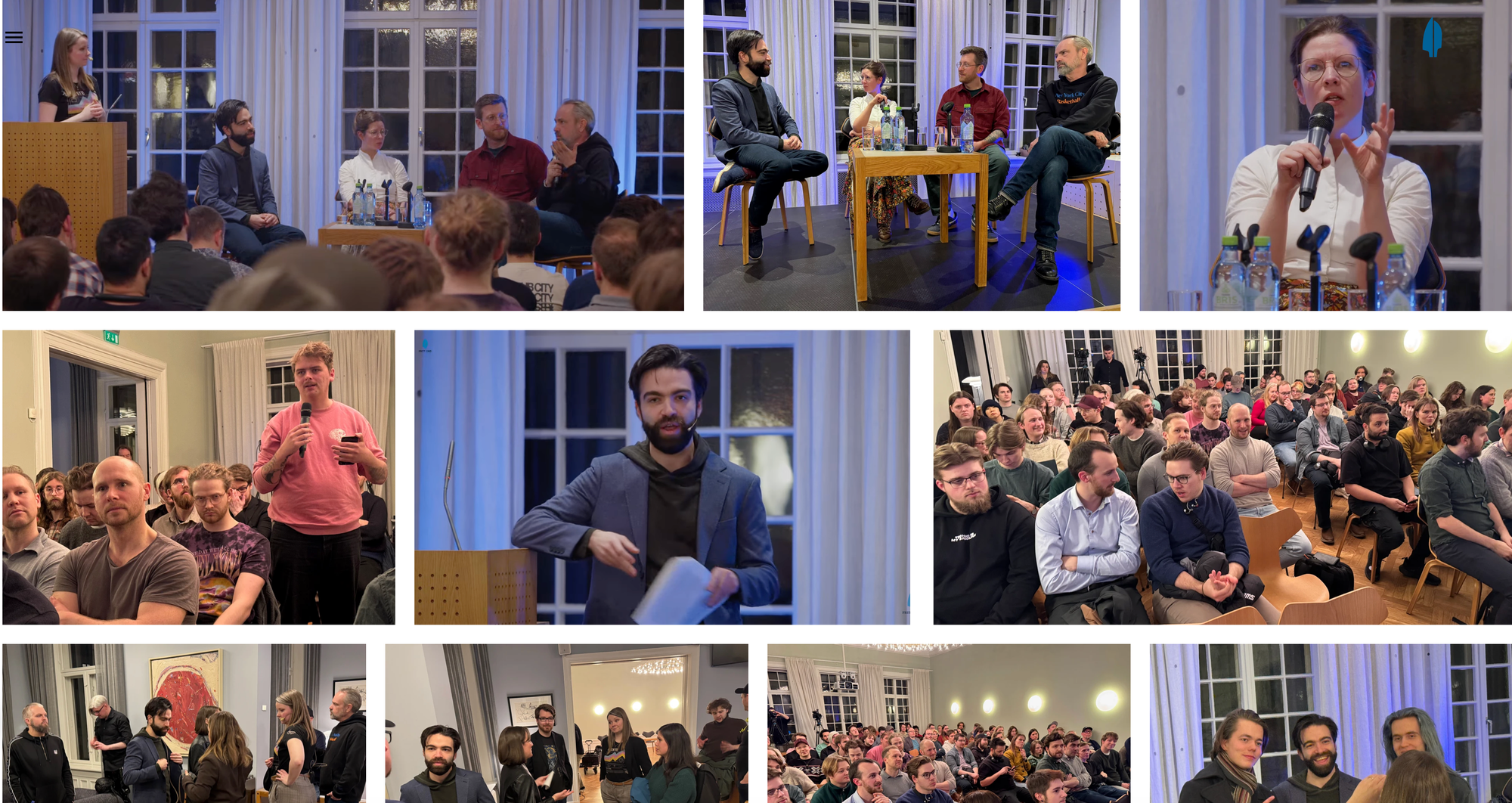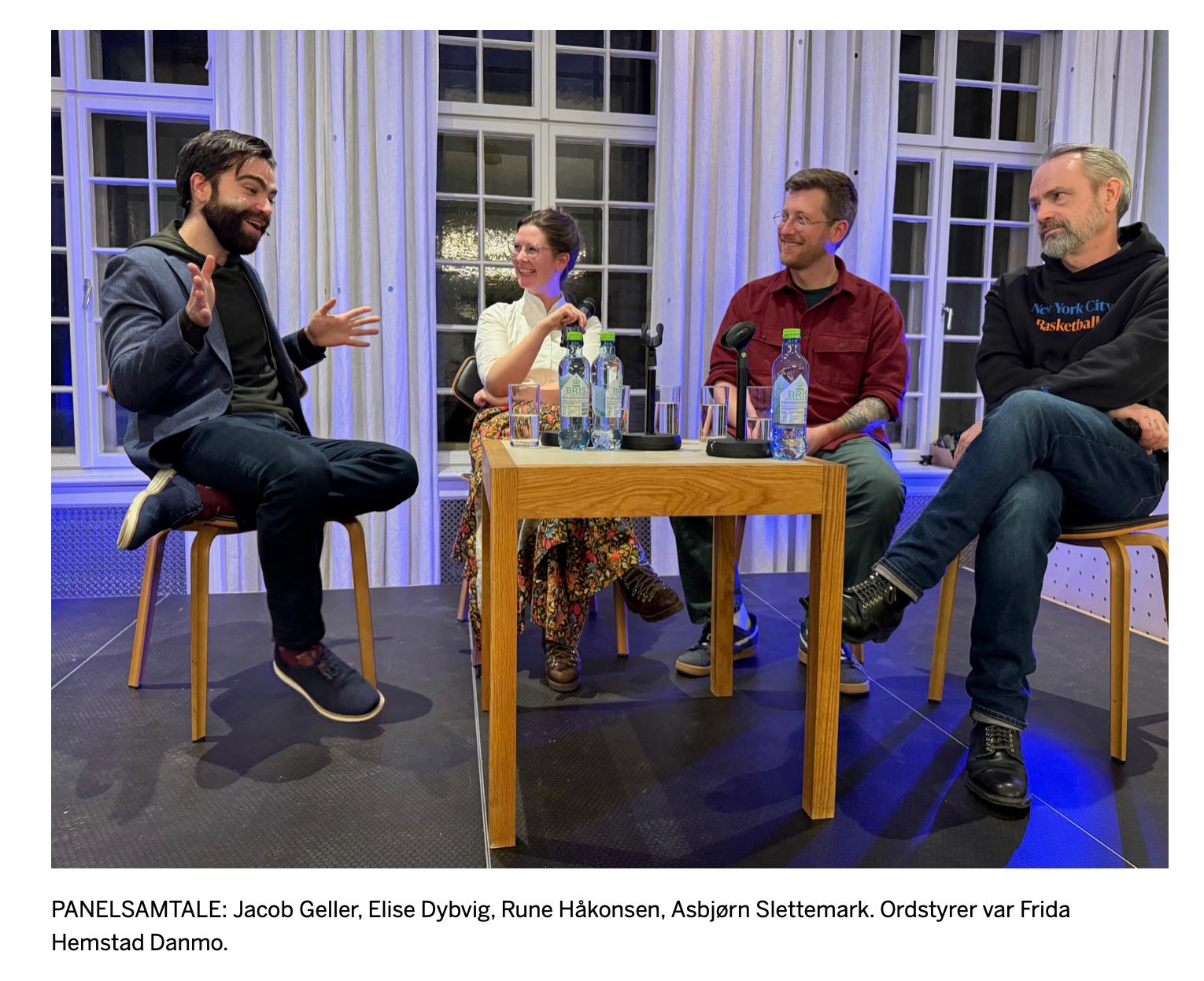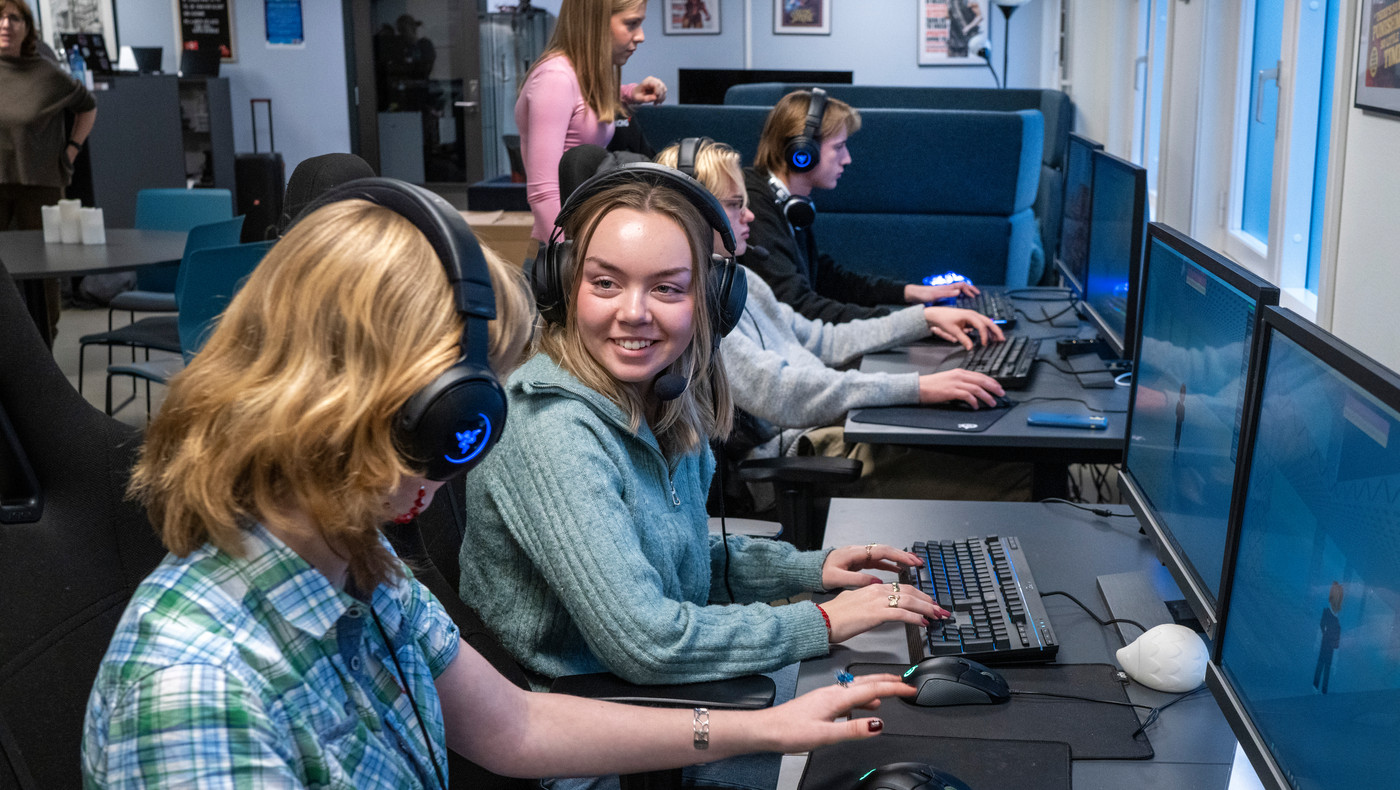– Computer games are also art
“The problem with far too many media reports about computer games is that they start begin with sentences like: ‘computer games have come a long way since Pac-Man’,” sighs American computer game critic Jacob Geller.
“Let us first simply agree that computer games are indeed an art form and an expression of culture, and then let us examine the works as part of the history of art and culture.
“All expressions that communicate ideas are art. This applies equally to paintings, literature and films, as well as to stand-up, graphic novels and children’s drawings, and naturally also to computer games. Accordingly, the question is no longer whether or notcomputer games are art, but rather how to review games and discuss them as aspects of art and culture.”
These are the words of the American computer game critic Jacob Geller. In February, he visited Fritt Ord to talk about ‘data reviews for a new era’.
Books and pictorial art v. computer games
Geller has more than a million subscribers on YouTube and is well-known for video reviews of computer games in which he equates film, literature and pictorial art, using political and sociological analyses across the genres.
“Although each genre has its own ways of communicating, e.g. games have sound and movement, the goals of all expressions of culture are the same: to convey ideas and to express emotions.
In his video essays, for example, Jacob Geller discusses the anti-Semitism in the game ‘Wolfenstein’, and compares the computer game ‘Season’ with Neville Shute’s novel ‘On the Beach’ or with Andreas Malm’s nonfiction book ‘How to Blow Up a Pipeline’, or with a painting.
“The slower pace of ‘Season’ creates a atmosphere of melancholy in the same way as a painting by Rothko”, he maintains.
For instance, Geller examines how the American version of the French espionage series ‘Le Bureau’ employs architecture, and he discusses the relationship between school shootings, games that involve shooting, and the way in which school buildings are constructed in the US, based on how to evade school shooters.
Becoming part of art history and culture wars
Thus far, Geller has rolled the credits on 531 games and reviewed 172 of them in his videos.
“My advice to anyone who wants to review computer games is this: read about everything other than games! Read book reviews, theatre reviews, novels, and research articles. The more you read, the more you will discover that computer games fit into the broad scope of the history of art and culture”, continues the critic.
According to Geller, reviewing computer games as an art form fits neatly into art history, as yet another reflection of ‘the culture war against contemporary art’, from back when the Nazis banned ‘degenerate art" in Hitler’s Germany, or of the protests against the painter Barnett Newman’s work ’Who’s Afraid of Red, Yellow, and Blue’ in the 1960s, or photographer Andres Serrano’s photograph ‘Piss Christ’ in the 1980s.
Parents did not understand the world of computer games
Geller grew up in a home that “appreciated fine literature and the theatre” with “parents who looked at games in about the same way as one looks at popcorn”. Already as a teen, Geller insisted that the computer games he played were art.
“Back then, though, I was primarily hoping that my mother and father would let me play as much ’Assassin’s Creed’, ‘Call of Duty’ and ’Mario Galaxy” as I wanted, and buy me a PlayStation 3."
Eventually, he took his own statement to heart and started reading about gaming theory. The first eye-opener for him was ‘Pilgrim in the Microworld’ (1976), a whole book that analysed the idea underlying a very simple Atari game called ‘Breakout’. The game consists solely of lines and balls.
Geller soon began to write his own analyses, then decided to use video to communicate them.

Don’t start with ‘Pac-Man’
“My method for convincing people that computer games were art, was to assume that I was right, and then to treat the games accordingly. I never embark on my essays by explaining what a computer game is. No one starts writing an ordinary newspaper article by explaining gravitation. We just take it for granted”, smiles Geller.
“Many reviews in major media open with sentences like ‘computer games have come a long way since ’Pac-Man’’ to attract readers who don’t know much about gaming. However, at that point, I and anyone else who enjoys gaming have already given up and stopped reading.”
“In 2025, we have to stop talking in public about computer games as though they were a shocking new phenomenon appearing out of the blue, requiring that they be treated differently from other art.”

Holds true even for games like ‘Disco Elysium’
He maintains that this message holds true even if we are talking about relatively advanced games that include extensive narrative, such as ‘Shadow of the Colossus’, ‘Final Fantasy VI’, ‘The Last of US’, ‘Journey’, ‘Disco Elysium’, or others like ‘Breakout’ or “games in which you only strike someone with a sword or something similar”.
“‘Disco Elysium’ is, of course, a game that is almost entirely in the form of a novel that is brimming with metaphors. That being said, I find it almost as exciting to examine the ideas behind a shooting game. Perhaps they are not as simple as they first appear to be?”, he asks.
He considers a review entitled ‘We Don’t Really Talk About Kenny’ from the action game ‘The Walking Dead’ to be a good example. It refers to child abuse and post-traumatic stress syndrome as taboo topics in the game.
Geller recommends that critics explore the emotions and mood of a game.
“Emotions always open the door.

Inferiority complex due to gaming
However, games have several distinguishing features that other art forms often lack. Games are often designed to be played for thousands of hours, they often encourage competition, and they require a great deal of advance knowledge of the game to learn how to play and how to get started.
One in three Norwegians plays computer games weekly. At the same time, computer games rank lowest in status compared with other art forms, according to a new survey conducted by Fritt Ord in February 2025.
“Many gamers have inferiority complexes as a result of gaming. They feel like they have to justify the time they spend on gaming. People who read books and attend the theatre need not defend themselves in the same way”, Geller adds.
“Gaming is still young. We lack the history and prestige of older art forms. The gaming industry is not helping matters at present either.”
He is referring to the fact that great deal of marketing for computer games targets children, and he feels the content of many video games is immature. “Gaming culture exists in a very ‘commercialised environment’”, Geller points out.
“There are art museums and exhibitions for paintings, and film festivals for films. However, computer games are featured at press conferences that show 30 consecutive commercial ads. The games themselves do us no favours with that format.
“What is more", he says, "there are publishers who buy the loyalty of YouTubers.”

The Ibelin effect
During the panel discussion following Geller’s lecture, available here, Asbjørn Slettemark agreed with Geller’s message.
“Regardless of whether or not we are talking about the ‘Fallout’ games, the film version of ‘The Jackal’ or the Japanese drama ‘Asula’, I treat them as art”, stated Slettemark.
Elise Dybvig from Morgenbladet and Rune Håkonsen from NRK agree that medias’ attitude to computer games is changing.
“When I was 19, there were no 39-year-olds who cared about computer games. That is changing quickly now”, Håkonsen commented.
Everyone noticed the effect of the film ‘Ibelin’, after it debuted in 2024. For some time, all anyone wanted to talk about was why so few media outlets covered computer games." Then things got quiet again, according to the panel. Several panellists mentioned dilemmas facing cultural affairs writers, for example, if computer games are to be in, perhaps something else has to go out.
“I don’t play much myself, but as a cultural affairs journalist, in recent years, I have noticed how various elements from computer games are sneaking into the other expressions of culture”, remarked Dybvig.
“As a journalist, I should catch these trends, examine them, analyse what they are, and be able to describe them.
In this context, Fritt Ord has translated the word ‘art’ to ‘kunst/kulturuttrykk’, and ‘games’ to ‘dataspill’.




